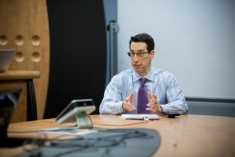Rutgers Law Launches New and Expanded Intellectual Property Programs

Rutgers Law School is highly regarded for its robust expertise and comprehensive programming in the field of intellectual property (IP) law. Students have access to a wide range of courses, including those on patents, trade secrets, copyrights, and trademarks, as well as skills-based training courses in patent litigation, patent drafting, and more. Additionally, Rutgers Law boasts an Intellectual Property Law Clinic that serves businesses, non-profits, and entrepreneurs, and students can further fine-tune their skills by joining the Patent Prosecution Team or the Rutgers Intellectual Property Legal Association (RIPLA). New additions for the fall 2024 semester will enrich the pathway for students interested in patent law, further strengthening the school’s already outstanding reputation in this field.

New IP Certificate Program
Beginning in fall 2024, students can enroll in the Certificate Program in Intellectual Property Law. “This new certificate encourages students to take the full range of IP classes we offer, meet with the faculty, and pursue a capstone experience like moot court, clinic, or a writing experience,” says Michael Carrier, co-chair of the certificate program, co-director of the Rutgers Institute for Information Policy and Law, and Board of Governors Professor of Law. In this way, the new certificate will capitalize on existing IP resources at Rutgers Law to not only provide a framework for students interested in the field, but also formally recognize them with a certificate that will set them apart in the job market.
To complete the Certificate Program in Intellectual Property Law, students are required to take a minimum of 15 credits in a combination of foundation and supplemental courses, and graduate with a minimum 3.0 GPA in those courses. “This certificate shows an employer that the student is interested in IP, has taken the courses that Rutgers Law offers, has thought carefully about their IP education and, particularly when they have a capstone, has gained experience that can carry over to day-to-day life as an IP attorney,” Carrier adds.
Patent Prosecution Team
Also new for 2024 is an expansion of the Rutgers Law National Patent Prosecution Team. Members of the team already compete in the United States Patent and Trademark Office (USPTO) Patent Application Drafting Competition to demonstrate their proficiency in filing patent applications. Recently, Rutgers Law has also been chosen by the USPTO to be one of a select group of law schools to compete in the inaugural year of the Patent Trial Appeal Board Moot Court Competition. This competition assesses proficiency in briefing and arguing appeals of a patent examiner’s decision to the Patent Trial and Appeal Board (PTAB).
As part of the competition, team members will write a brief and then argue before a panel of USPTO administrative patent judges to defend or oppose the examiner’s decision. The team will be coached by Distinguished Practice Professor and Associate Dean for Professional and Skills Education Andrew Rossner, alongside Corey Poker ’18 and practicing patent prosecution attorneys. “Rutgers Law was one of only 10 law schools in the country selected to participate in the competition,” notes Arthur L. Dickson Scholar and IP certificate program co-chair Sabrina Safrin, who teaches patent law and prepared the selection application with Rossner. “The new team adds to the patent opportunities at Rutgers Law, and we are so proud to have been selected.”
Scholarship Opportunity
Finally, the new Hope Family Patent Bar Exam Award is available to current Newark students or recent alumni who are interested in taking the patent bar exam offered by the USPTO. Applicants must have an undergraduate degree in science and have successfully completed a patent law course with a B average or better. The scholarship will cover the cost of private patent bar exam preparation as well as the registration fee for the exam, and priority will be given to students with a financial need. Rutgers Law expects to award two students each year, one of whom will be a student or alumnus/a of the Minority Student Program (MSP).
Indeed, students interested in IP will find abundant opportunities at Rutgers Law, further enriched by these new offerings. “Rutgers Law has developed one of the finest IP skills programs in the country,” says Rossner. “When our students leave law school, they not only know the law, but they also know how to use it.”